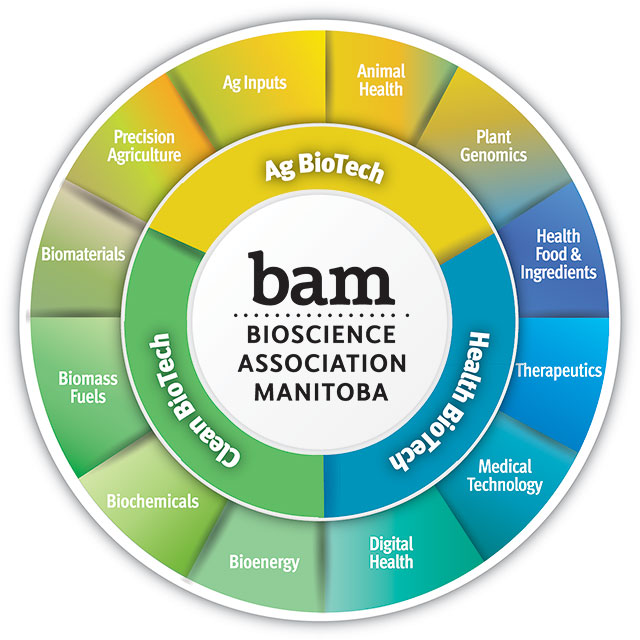BIOSCIENCE
Manitoba is home to a large and diverse bioscience industry. Some quick facts:
- Manitoba’s largest export is medicaments
- Bioscience currently employs over 16,000 people in Manitoba
- Bioscience generates an annual revenue of over $10 billion within Manitoba
- Manitoba is Canada’s second largest producer of pharmaceutical products
- The Bioscience workforce is highly educated. Over 53% of employees have at least a bachelor’s degree.
The Bioscience industry seen as the combination of 3 subsectors: Clean Biotech, Ag Biotech and Health Biotech.

Ag Biotech
The Ag Biotech sector focuses on developing and commercializing innovations and tools related to agricultural plants or animals for the purpose of increasing yields, production efficiencies and/or impacts and/or improving nutritional profiles. For example, Ag Biotech companies work in the areas of plant genomics, precision agriculture and health treatments for animals. A few companies in this subsector include Farmer’s Edge and Conviron.
Health Biotech
The Health Biotech consists of companies developing and commercializing innovations that allow for the early identification, prevention and/or treatment of costly and debilitating illness and disease. The Health Biotech sector traditionally focuses on treatments, diagnostics and therapeutics. It now includes functional (healthier for you) foods and ingredients and natural health products. Some of the major employers in this subsector include Emergent BioSolutions and Novartis.
Clean Biotech
The Clean Biotech sector uses materials from or with living organisms to generate new value-added products, with the goal to reduce negative impacts on the environment. Clean Biotech companies work in the areas of renewable fuels, industrial by-products, and bioremediation technologies. A Manitoba company in this subsector is XiteBio Technologies.
Post-Secondary Education Programs
Universities and colleges from across Manitoba offer education opportunities related to the bioscience fields. Degree, diploma and certificate programs can be found in almost all post secondary institutions across the province. Additionally, the support services for the bioscience sector include accounting, human resources, marketing, and information technology. You don’t have to be a scientist to work in bioscience!
Associations / Sector Councils
For more information about career opportunities in the bioscience sector, as well as education and training, we encourage you to visit the website below where you will discover more about this industry and what it has to offer.




